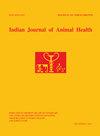土耳其无症状成年流浪猫狗中隐孢子虫属和十二指肠贾第虫的分子特征和人畜共患意义
IF 0.5
4区 农林科学
Q4 AGRICULTURE, DAIRY & ANIMAL SCIENCE
引用次数: 0
摘要
背景:隐孢子虫和十二指肠贾第虫是重要的原生动物寄生虫,因为它们的宿主范围很广,有可能成为人畜共患病。这些寄生虫是隐孢子虫病和贾第鞭毛虫病的罪魁祸首,是重大的健康问题,已引起公众和兽医领域的关注。猫狗等宠物很容易感染这些疾病,并在将这些原生动物传播给人类的过程中扮演着重要角色。本研究旨在确定无症状成年流浪猫和流浪狗中隐孢子虫和贾第鞭毛虫的流行率、种类、基因型和人畜共患意义。研究方法在土耳其安纳托利亚东南部迪亚巴克尔市收集了 75 只成年流浪动物(42 只狗和 33 只猫)的粪便样本。采用直接免疫荧光试验来确认收集的粪便样本中是否存在双孢子虫囊蚴和隐孢子虫卵囊。按照生产商的规定,使用显微镜分析来计算每克样本中的囊肿/卵囊数量。使用聚合酶链反应(PCR)对贾第鞭毛虫 SSU-rDNA 和隐孢子虫 SSU rRNA 基因进行分子确认。所有阳性样本的次级 PCR 产物都在自动测序仪上进行了单向测序。利用美国国家生物技术信息中心数据库进行BLAST比对,对核苷酸序列进行分析。结果42只猫和33只狗的隐孢子虫感染率分别为7.14%和9.09%。猫和狗的十二指肠球菌感染率分别为 23.80%和 54.54%。每克猫和狗粪便中隐孢子虫卵囊的平均数量分别为 1866.3 个和 1813.3 个。每克猫和狗粪便中的十二指肠球孢子虫囊蚴平均数量分别为 1011.6 个和 4786 个。所有隐孢子虫分离物均被确定为犬隐孢子虫和猫隐孢子虫。研究中发现的犬隐孢子虫和猫隐孢子虫分离物 MT329018.1 和 MN696800.1、AF159113.1 和 KM977642.1 分别与 Genbank 编号相似。从十二指肠球菌分离物中获得的 130 bp 基因片段的序列结果显示,在狗中发现了 A、E、C、D 组合,在猫中发现了 A 和 E 组合。本研究对猫十二指肠球菌分离物的序列分析确定了 A(50%/10)和 E(50%/10)群。在本研究中,E 组合是在狗体内分离出的最常见基因型(38.8%),其次是 C 组合(27.7%)、D 组合(16.6%)和 A 组合(15.5%)。在猫和狗中检测到了具有人畜共患病重要性的A基因组,而在猫和狗中检测到E基因组则是土耳其的首次报道。本文章由计算机程序翻译,如有差异,请以英文原文为准。
Molecular Characterization and Zoonotic Significance of Cryptosporidium spp. and Giardia duodenalis in Asymptomatic Adult Stray Cats and Dogs in Turkey
Background: Cryptosporidium species and Giardia duodenalis are important protozoan parasites due to their wide host range and potential as zoonotic diseases. These parasites, responsible for Cryptosporidiosis and Giardiasis, are significant health concerns and have garnered attention from both the public and veterinary fields. Pets, such as dogs and cats, are susceptible to these infections and play a crucial role in transmitting these protozoans to humans. This study was conducted to determine the prevalence, species, genotypes and zoonotic significance of Cryptosporidium and Giardia in asymptomatic adult stray cats and dogs. Methods: Fecal samples from 75 adult stray animal, 42 dogs and 33 cats, were collected in Diyarbakýr city, southeastern Anatolia, Turkey. Direct immunofluorescence test was used to confirm the presence of G. duoenalis cysts and cryptosporidium spp. oocysts in collected fecal samples. Microscopic analysis was used to count the number of cysts/oocysts per gram as specified by the manufacturer. Molecular confirmation was done with Polymerase chain reaction (PCR) using Giardia SSU-rDNA and Cryptosporidium spp. SSU rRNA gene. The secondary PCR products of all positive samples were sequenced in one directions on an automated sequencer. Nucleotide sequence analysis was performed by BLAST alignment using the National Center for Biotechnology Information database. Result: The prevalence of Cryptosporidium was 7.14% in 42 cats and 9.09% in 33 dogs. The prevalence of G. duodenalis was 23.80% in cats and 54.54% in dogs. The average number of Cryptosporidium spp. oocysts per gram of cat and dog feces was 1866.3 and 1813.3, respectively. The average number of G. duodenalis cysts per gram of cat and dog feces was 1011.6 and 4786, respectively. All Cryptosporidium isolates were determined as C. canis in dogs and C. felis in cats. C. canis and C. felis isolates identified in the study, MT329018.1 and MN696800.1, AF159113.1 and KM977642.1 showed similarity with Genbank number, respectively. Assemblages A, E, C, D were found in dogs and assemblages A and E in cats in the result of the sequence of 130 bp gene fragments obtained from G. duodenalis isolates. This study sequence analysis of G. duodenalis cat isolates identified assemblages A (50%/10) and E (50%/10). In this study, assemblage E was the most common genotype isolated in dogs (38.8%), followed by Assemblage C (27.7%), Assemblage D (16.6%) and Assemblage A (15.5%). Assemblage A, which has zoonotic importance, was detected in cats and dogs, while assemblage E in cats and dogs was reported for the first time in Turkey.
求助全文
通过发布文献求助,成功后即可免费获取论文全文。
去求助
来源期刊

Indian Journal of Animal Research
AGRICULTURE, DAIRY & ANIMAL SCIENCE-
CiteScore
1.00
自引率
20.00%
发文量
332
审稿时长
6 months
期刊介绍:
The IJAR, the flagship print journal of ARCC, it is a monthly journal published without any break since 1966. The overall aim of the journal is to promote the professional development of its readers, researchers and scientists around the world. Indian Journal of Animal Research is peer-reviewed journal and has gained recognition for its high standard in the academic world. It anatomy, nutrition, production, management, veterinary, fisheries, zoology etc. The objective of the journal is to provide a forum to the scientific community to publish their research findings and also to open new vistas for further research. The journal is being covered under international indexing and abstracting services.
 求助内容:
求助内容: 应助结果提醒方式:
应助结果提醒方式:


